BUS300: Coca-Cola's Global Integration - Management Report
VerifiedAdded on 2022/10/17
|6
|754
|12
Report
AI Summary
This report provides an analysis of Coca-Cola's global integration strategy. It begins by outlining the nature, structure, and types of products and services offered by Coca-Cola, followed by an examination of two key factors in the organization's external environment: technology and social factors related to consumer preferences. The report then assesses how primary stakeholders, including customers and employees, impact the company's profitability. Furthermore, it addresses controversial aspects of Coca-Cola's corporate social responsibility, specifically concerning its water usage and environmental claims. The report concludes by referencing the sources used in its analysis, offering a comprehensive overview of Coca-Cola's business operations and challenges in a global context.
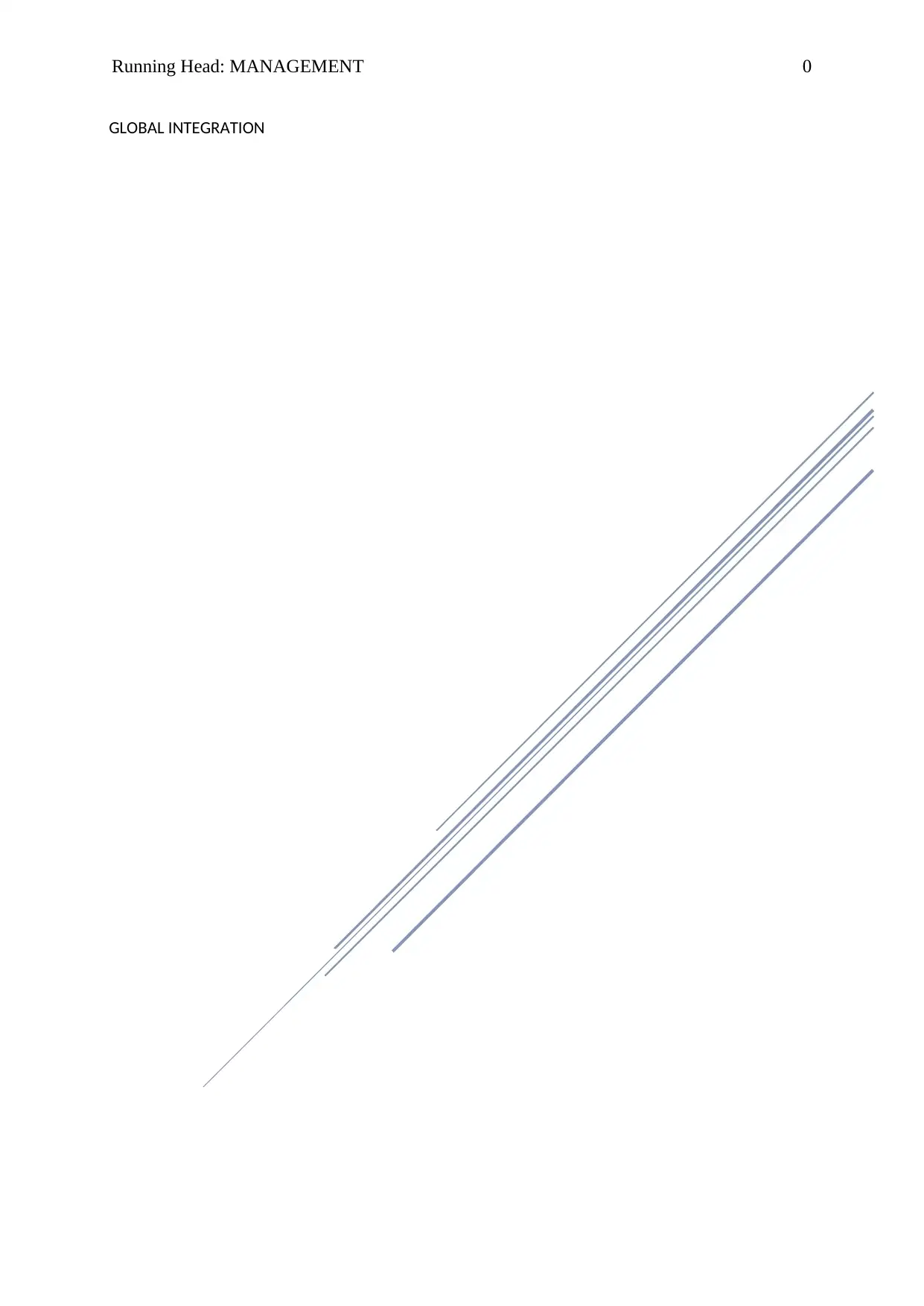
Running Head: MANAGEMENT 0
GLOBAL INTEGRATION
GLOBAL INTEGRATION
Paraphrase This Document
Need a fresh take? Get an instant paraphrase of this document with our AI Paraphraser
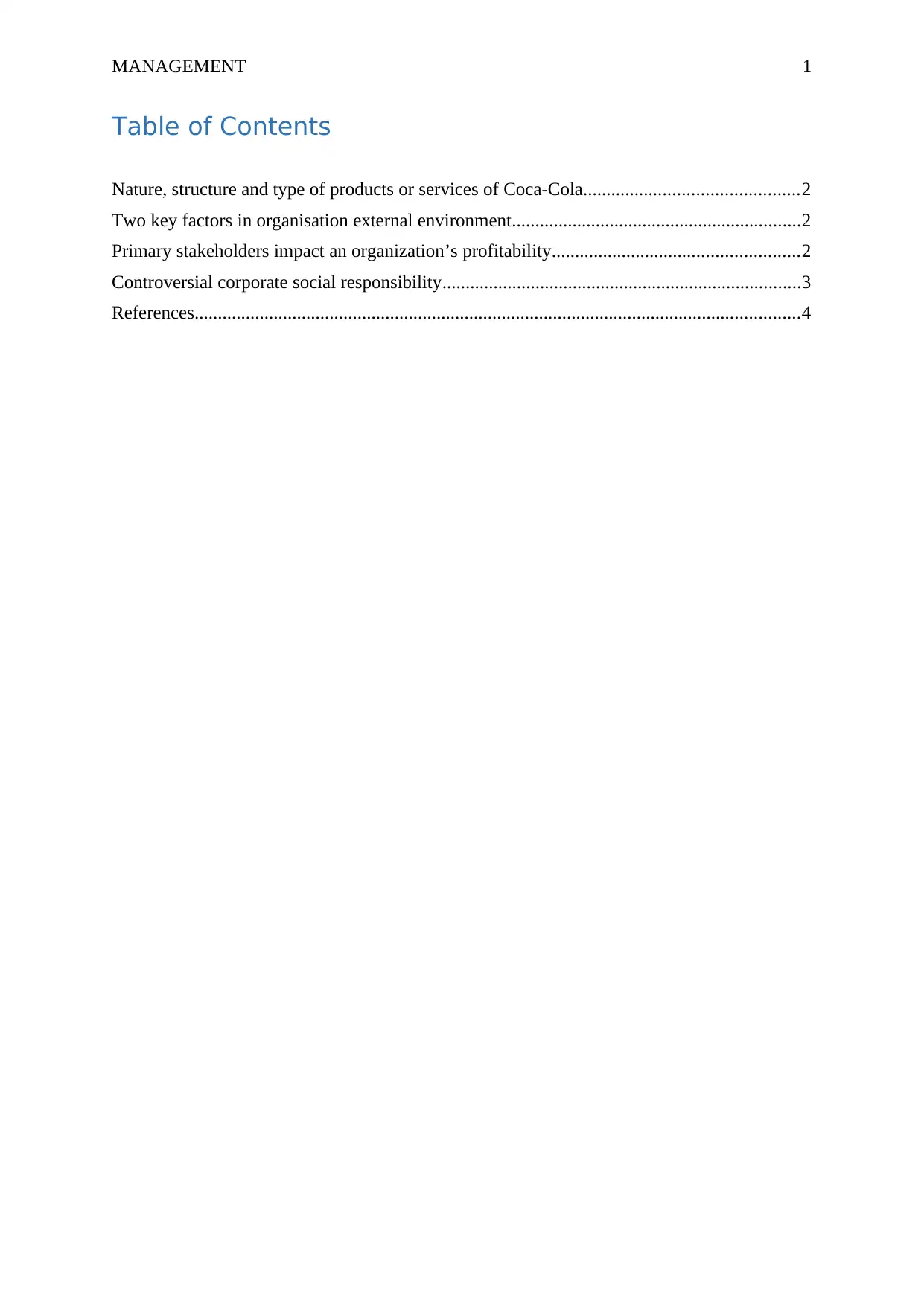
MANAGEMENT 1
Table of Contents
Nature, structure and type of products or services of Coca-Cola..............................................2
Two key factors in organisation external environment..............................................................2
Primary stakeholders impact an organization’s profitability.....................................................2
Controversial corporate social responsibility.............................................................................3
References..................................................................................................................................4
Table of Contents
Nature, structure and type of products or services of Coca-Cola..............................................2
Two key factors in organisation external environment..............................................................2
Primary stakeholders impact an organization’s profitability.....................................................2
Controversial corporate social responsibility.............................................................................3
References..................................................................................................................................4
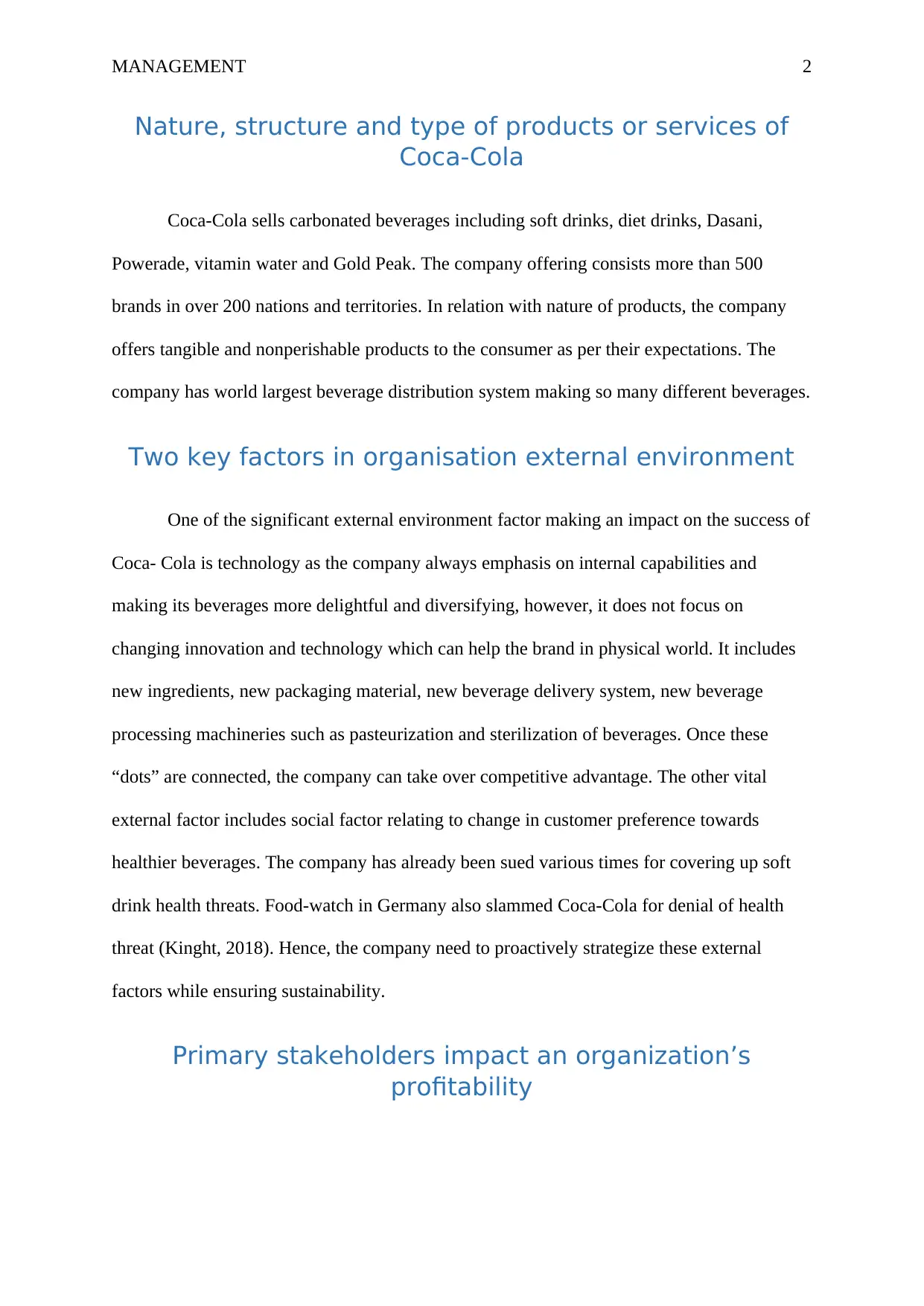
MANAGEMENT 2
Nature, structure and type of products or services of
Coca-Cola
Coca-Cola sells carbonated beverages including soft drinks, diet drinks, Dasani,
Powerade, vitamin water and Gold Peak. The company offering consists more than 500
brands in over 200 nations and territories. In relation with nature of products, the company
offers tangible and nonperishable products to the consumer as per their expectations. The
company has world largest beverage distribution system making so many different beverages.
Two key factors in organisation external environment
One of the significant external environment factor making an impact on the success of
Coca- Cola is technology as the company always emphasis on internal capabilities and
making its beverages more delightful and diversifying, however, it does not focus on
changing innovation and technology which can help the brand in physical world. It includes
new ingredients, new packaging material, new beverage delivery system, new beverage
processing machineries such as pasteurization and sterilization of beverages. Once these
“dots” are connected, the company can take over competitive advantage. The other vital
external factor includes social factor relating to change in customer preference towards
healthier beverages. The company has already been sued various times for covering up soft
drink health threats. Food-watch in Germany also slammed Coca-Cola for denial of health
threat (Kinght, 2018). Hence, the company need to proactively strategize these external
factors while ensuring sustainability.
Primary stakeholders impact an organization’s
profitability
Nature, structure and type of products or services of
Coca-Cola
Coca-Cola sells carbonated beverages including soft drinks, diet drinks, Dasani,
Powerade, vitamin water and Gold Peak. The company offering consists more than 500
brands in over 200 nations and territories. In relation with nature of products, the company
offers tangible and nonperishable products to the consumer as per their expectations. The
company has world largest beverage distribution system making so many different beverages.
Two key factors in organisation external environment
One of the significant external environment factor making an impact on the success of
Coca- Cola is technology as the company always emphasis on internal capabilities and
making its beverages more delightful and diversifying, however, it does not focus on
changing innovation and technology which can help the brand in physical world. It includes
new ingredients, new packaging material, new beverage delivery system, new beverage
processing machineries such as pasteurization and sterilization of beverages. Once these
“dots” are connected, the company can take over competitive advantage. The other vital
external factor includes social factor relating to change in customer preference towards
healthier beverages. The company has already been sued various times for covering up soft
drink health threats. Food-watch in Germany also slammed Coca-Cola for denial of health
threat (Kinght, 2018). Hence, the company need to proactively strategize these external
factors while ensuring sustainability.
Primary stakeholders impact an organization’s
profitability
⊘ This is a preview!⊘
Do you want full access?
Subscribe today to unlock all pages.

Trusted by 1+ million students worldwide
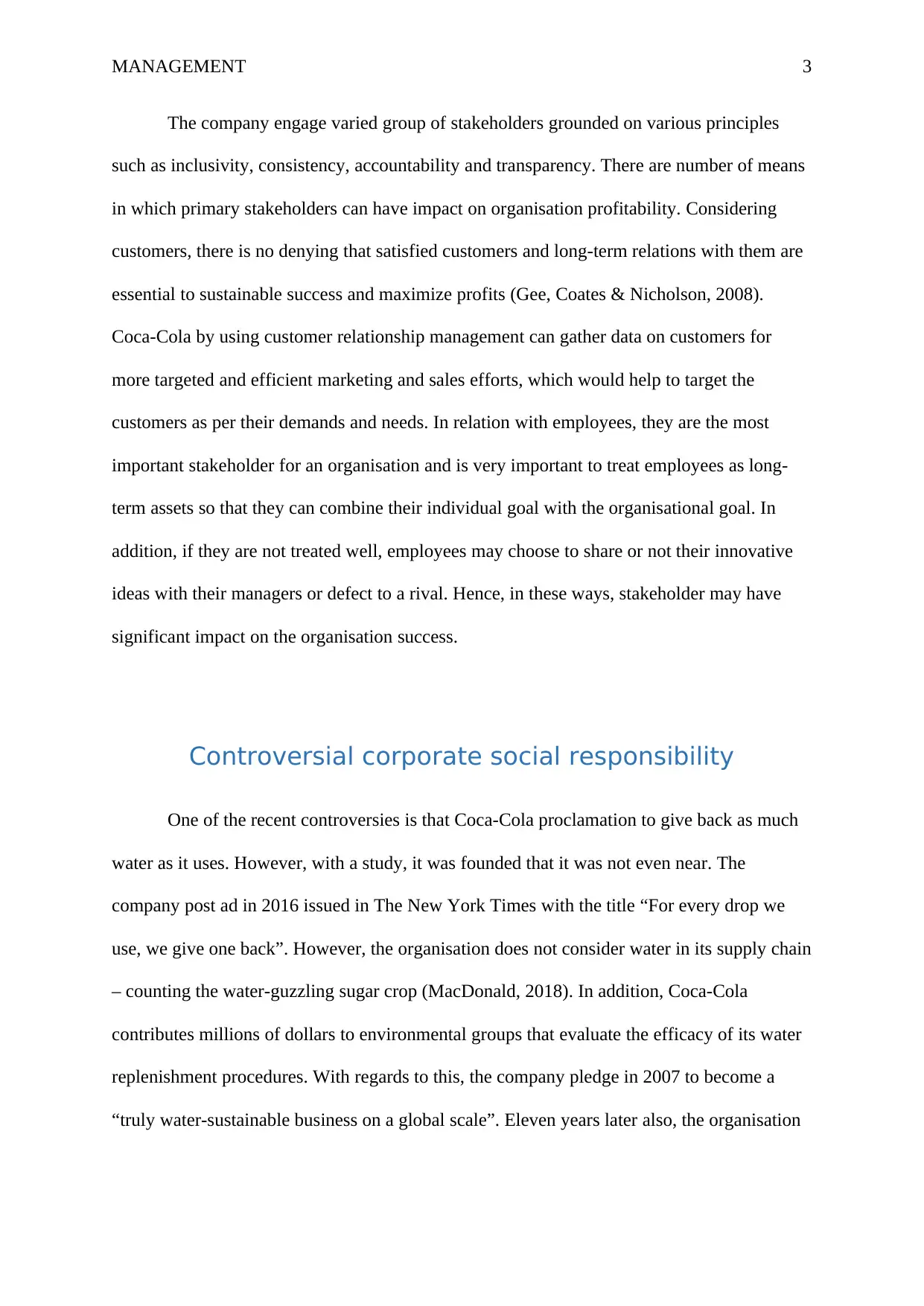
MANAGEMENT 3
The company engage varied group of stakeholders grounded on various principles
such as inclusivity, consistency, accountability and transparency. There are number of means
in which primary stakeholders can have impact on organisation profitability. Considering
customers, there is no denying that satisfied customers and long-term relations with them are
essential to sustainable success and maximize profits (Gee, Coates & Nicholson, 2008).
Coca-Cola by using customer relationship management can gather data on customers for
more targeted and efficient marketing and sales efforts, which would help to target the
customers as per their demands and needs. In relation with employees, they are the most
important stakeholder for an organisation and is very important to treat employees as long-
term assets so that they can combine their individual goal with the organisational goal. In
addition, if they are not treated well, employees may choose to share or not their innovative
ideas with their managers or defect to a rival. Hence, in these ways, stakeholder may have
significant impact on the organisation success.
Controversial corporate social responsibility
One of the recent controversies is that Coca-Cola proclamation to give back as much
water as it uses. However, with a study, it was founded that it was not even near. The
company post ad in 2016 issued in The New York Times with the title “For every drop we
use, we give one back”. However, the organisation does not consider water in its supply chain
– counting the water-guzzling sugar crop (MacDonald, 2018). In addition, Coca-Cola
contributes millions of dollars to environmental groups that evaluate the efficacy of its water
replenishment procedures. With regards to this, the company pledge in 2007 to become a
“truly water-sustainable business on a global scale”. Eleven years later also, the organisation
The company engage varied group of stakeholders grounded on various principles
such as inclusivity, consistency, accountability and transparency. There are number of means
in which primary stakeholders can have impact on organisation profitability. Considering
customers, there is no denying that satisfied customers and long-term relations with them are
essential to sustainable success and maximize profits (Gee, Coates & Nicholson, 2008).
Coca-Cola by using customer relationship management can gather data on customers for
more targeted and efficient marketing and sales efforts, which would help to target the
customers as per their demands and needs. In relation with employees, they are the most
important stakeholder for an organisation and is very important to treat employees as long-
term assets so that they can combine their individual goal with the organisational goal. In
addition, if they are not treated well, employees may choose to share or not their innovative
ideas with their managers or defect to a rival. Hence, in these ways, stakeholder may have
significant impact on the organisation success.
Controversial corporate social responsibility
One of the recent controversies is that Coca-Cola proclamation to give back as much
water as it uses. However, with a study, it was founded that it was not even near. The
company post ad in 2016 issued in The New York Times with the title “For every drop we
use, we give one back”. However, the organisation does not consider water in its supply chain
– counting the water-guzzling sugar crop (MacDonald, 2018). In addition, Coca-Cola
contributes millions of dollars to environmental groups that evaluate the efficacy of its water
replenishment procedures. With regards to this, the company pledge in 2007 to become a
“truly water-sustainable business on a global scale”. Eleven years later also, the organisation
Paraphrase This Document
Need a fresh take? Get an instant paraphrase of this document with our AI Paraphraser

MANAGEMENT 4
still has nearly 99 per cent of its water footprints to go as per the standards of the 2008
assessment.
still has nearly 99 per cent of its water footprints to go as per the standards of the 2008
assessment.
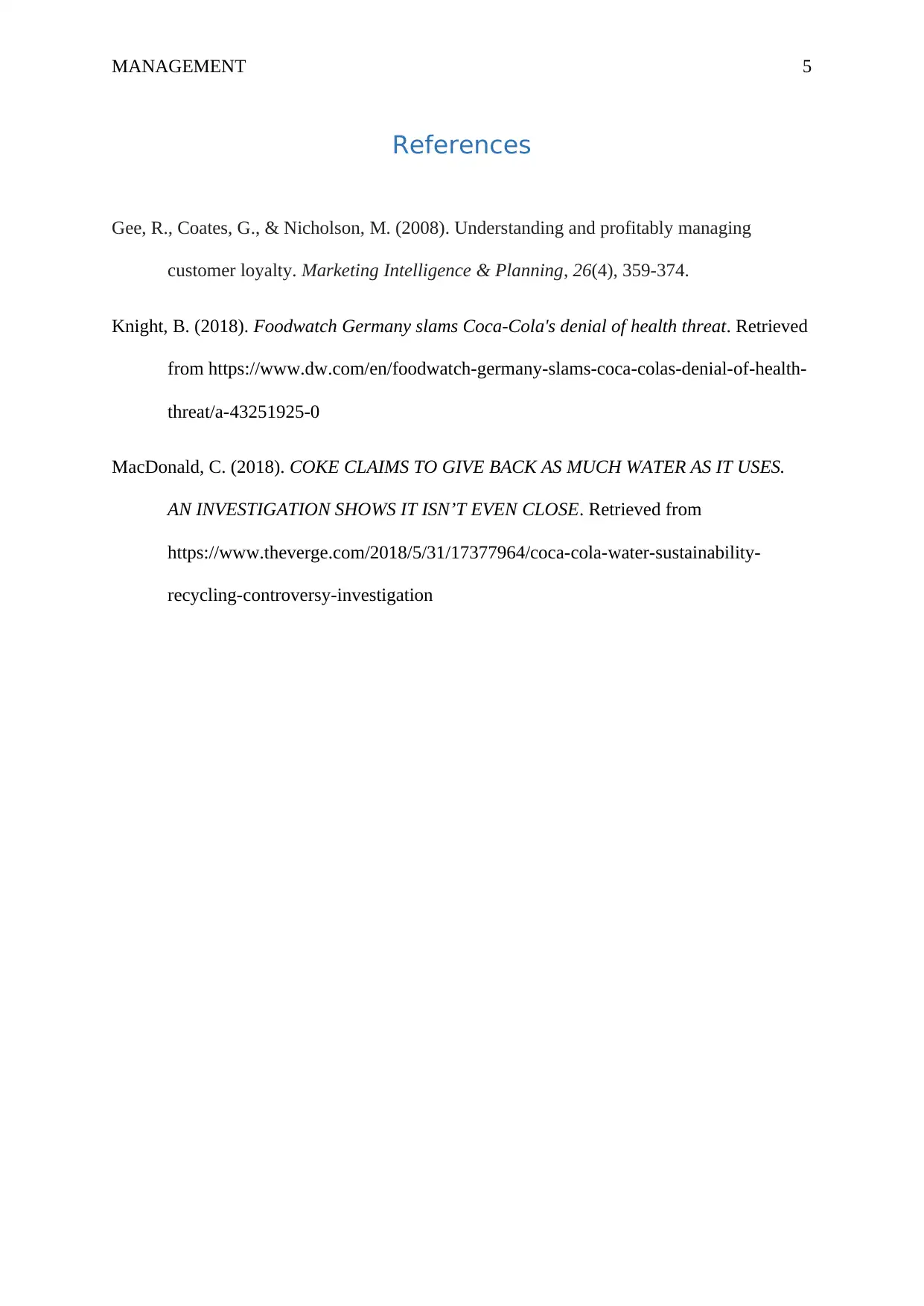
MANAGEMENT 5
References
Gee, R., Coates, G., & Nicholson, M. (2008). Understanding and profitably managing
customer loyalty. Marketing Intelligence & Planning, 26(4), 359-374.
Knight, B. (2018). Foodwatch Germany slams Coca-Cola's denial of health threat. Retrieved
from https://www.dw.com/en/foodwatch-germany-slams-coca-colas-denial-of-health-
threat/a-43251925-0
MacDonald, C. (2018). COKE CLAIMS TO GIVE BACK AS MUCH WATER AS IT USES.
AN INVESTIGATION SHOWS IT ISN’T EVEN CLOSE. Retrieved from
https://www.theverge.com/2018/5/31/17377964/coca-cola-water-sustainability-
recycling-controversy-investigation
References
Gee, R., Coates, G., & Nicholson, M. (2008). Understanding and profitably managing
customer loyalty. Marketing Intelligence & Planning, 26(4), 359-374.
Knight, B. (2018). Foodwatch Germany slams Coca-Cola's denial of health threat. Retrieved
from https://www.dw.com/en/foodwatch-germany-slams-coca-colas-denial-of-health-
threat/a-43251925-0
MacDonald, C. (2018). COKE CLAIMS TO GIVE BACK AS MUCH WATER AS IT USES.
AN INVESTIGATION SHOWS IT ISN’T EVEN CLOSE. Retrieved from
https://www.theverge.com/2018/5/31/17377964/coca-cola-water-sustainability-
recycling-controversy-investigation
⊘ This is a preview!⊘
Do you want full access?
Subscribe today to unlock all pages.

Trusted by 1+ million students worldwide
1 out of 6
Related Documents
Your All-in-One AI-Powered Toolkit for Academic Success.
+13062052269
info@desklib.com
Available 24*7 on WhatsApp / Email
![[object Object]](/_next/static/media/star-bottom.7253800d.svg)
Unlock your academic potential
Copyright © 2020–2026 A2Z Services. All Rights Reserved. Developed and managed by ZUCOL.





